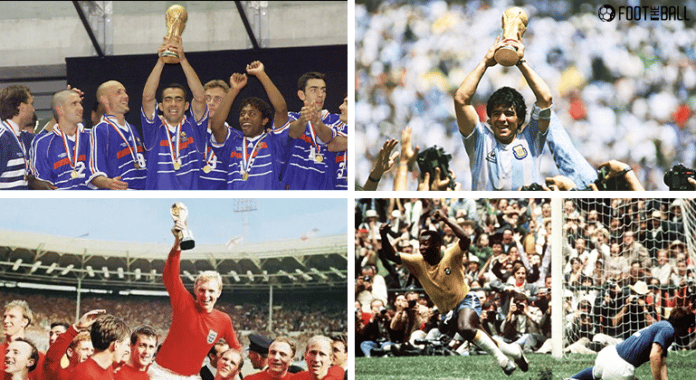While the FIFA World Cup is the zenith of men’s elite football, the final of the FIFA World Cup is the zenith of the zenith, and a dream of every professional who kicks a football to make their living.
Because of the heightened momentousness of the moment, the final of the world cup is incomparable to any other football match. It is a breeding ground for a peculiar kind of strangeness, of absurdity, of madness, of magnificence, and of long-lasting glory.
As we slowly inch closer to the 22nd men’s FIFA World Cup final and wish for another indelible final, FootTheBall has assorted a list of top 10 finals based on, frankly, their awesomeness in one way or the other.
France vs Argentina, 2022, Qatar: 3-3 (4-2)
The 2018 FIFA World Cup final is one of the most entertaining World Cup finals in recent memory. At 35, it was Lionel Messi’s last chance to win the World Cup, and after the loss to Saudi Arabia in their opening match, prospects looked slim that Argentina could win their third title.
However, with his back up against the wall, Lionel Messi came fighting, scoring five goals and providing three assists helping Argentina reach the final. However, standing in their way were defending champions France. It was the battle between Lionel Messi and Kylian Mbappe.
And the match didn’t disappoint as Argentina raced to a 2-0 lead in the first half. However, a brace from Mbappe in the final minutes made the game alive. Argentina retook the lead in the extra time, but Mbappe again scored, becoming the second player to score a World Cup hat trick in the final.
Argentina, though, had the final laugh as their goalkeeper Emiliano Martínez saved one penalty kick while La Albiceleste scored all of theirs to win their third title.
View this post on Instagram
West Germany vs Hungary, 1954, Switzerland: 3-2
Unbeaten for 31 matches and over four years, Hungary’s Golden Team, which boasted of superstars such as Sándor Kocsis and Ferenc Puskás, was known to put the fear of God in their opponents. Ask Poland who withdrew from their two-team world cup qualifying group with Hungary.
In their first world cup post-World War II, West Germany were confronting the mean task of taking on the Mighty Magyars, who were the clear favourites to lift their first world title. The West Germans needed a miracle to stop Hungary’s train of destiny at the Wankdorf Stadium in Bern, Switzerland, and they got, what is today known as “The Miracle of Bern”.
From going down 2-0 within the first 10 minutes, Helmut Rahn’s strike in the 84th minute completed the comeback, and brought not only sporting success but also international recognition to West Germany.
Argentina vs West Germany, 1986, Mexico: 3-2
It was Diego Armando Maradona’s tournament. It had Diego Armando Maradona’s momentous say in a thrilling final.
Using his Hand of God, Maradona and his Argentina brushed aside England to set up the final showdown against the then-two-time champions West Germany.
In a game that ebbed and flow, La Albiceleste started on a high and landed two punches before West Germany fought back and returned the favour. The telling knock-out blow came to decide the outcome was stirred by the maestro.
Heavily marked throughout the game, Maradona, in a moment of inspiration, found an inkling of space and pierced open West Germany’s tight defence to assist a sprinting Jorge Burruchaga in the 83rd minute of the game.
In front of more than 114,000 people in Mexico City’s Estadio Azteca, Carlos Bilardo-coached Argentina won their second world title in three tournaments.
Not the kind of international climax Müller would have expected, but he's definitely going down as a World Cup legend 💯
⚽ 10 Goals
🏆 1 World Cup#FIFAWorldCup #Qatar2022 pic.twitter.com/8zuxuWTYRj— FootTheBall FC (@FootTheBallFC) December 1, 2022
England vs West Germany, 1966, England: 4-2
Controversies bring jeopardy. Jeopardy elevates spectacles. And this final had it all – goals, a last-minute equaliser in normal time, debates (still raging in some circles!) over if Geoff Hurst’s shot in the 101st minute had crossed the line England’s decisive third goal.
With the West Germans operating on ‘All-out Attack’ mode for the remainder of the game, the English launched a counter and Hurst scored again in the 120th minute, making him the only player to date to score a hattrick in a men’s FIFA World Cup final.
The 1966 triumph at Wembley in front of more than 95,000 fans is the only time the English men’s team have gotten hold of the glorious golden trophy.
Uruguay vs Brazil, 1950, Brazil: 2-1
Technically not a final, which is the solitary reason why the Maracanazo finds itself so low in the pecking order (if being fourth out of 21 can be called low!).
Because of the format of this year’s world cup, arriving into this fixture, which was a defacto finale, La Seleção merely had to defy defeat and the gilded cup would sit in their lap for the first time ever while Uruguay needed all three points to become world champions for the second time.
The clout of this Brazil team, who had previously dismantled Spain and Sweden 6-1 and 7-1 respectively, was such that fans and even newspapers were celebrating their victory before the game. Obdulio Varela and his Uruguay were unimpressed by this behaviour, and had plans for spoiling Brazil’s carnival at home.
Brazil broke the deadlock in the 47th minute before La Celeste came roaring back with two goals in the latter parts of the second half to cause a great upset.
Held at Maracanã Stadium in Rio de Janeiro, Brazil, it was fitting that officially around 174,000 people – unofficial estimates claim that the number was over 200,000 – witnessed this extravagant exhibition of men’s football. However, we’re unsure if the majority of the home fans present in the stadium would hold such an objective perspective on the matter.
Italy vs France, 2006, Germany: 1(5)-1(3)
Another final that was more memorable for the high drama and narrative than the actual on-field display, particularly for the moment when the man-of-the-finals Zinedine Zidane went gung-ho in his final international appearance and headbutted Italy’s Marco Materazzi into a different galaxy for saying unkind things to the Frenchman’s family.
Having lost their captain in the 110th minute, Les Bleus’ ultimately were defeated 5-3 on penalties as the Azzuri laid hands on their fourth world title, but the first in 24 years.
Brazil vs Italy, 1970, Mexico: 4-1
In the popular imagination, Brazil, World Cups, and Joga Bonito seem to have a divine connection. It has been grand moments such as the 1970 final (or perhaps this whole world cup?) that has imprinted substance and reality into this widely and wildly popular imagination.
This Brazil team, which boasted superstars such as Pelé, Tostão, Jairzinho, Rivellino, Gerson, Carlos Alberto, Felix, and Edu, thoroughly humbled and dismantled the Azzuri 4-1 in the final, and capped off a world cup campaign of wonder where their football touched godly levels and constructed a football mythology of their own.
At the end of the night, Pelé walked out of the Estadio Azteca in Mexico City as a three-time world champion, and remains the only men’s player to date who can brag about this accomplishment.
West Germany vs Netherlands, 1974, Germany: 2-1
The footballing world owes a debt to the Netherlands, who have blessed the sport with their radical thinking and innovative playing styles that are taken for granted in today’s day and age. However, despite their game-changing contributions, the greatest trophy has always eluded them by the finest of margins. One good example of the same was the 1970 final versus West Germany in 1974 in Munich
In a battle of systems and tight tactics, Johan Cryuff-led Netherlands, who reeled their way through into the final playing not just football but Total Football, faced the defensively stringent hosts, West Germany. The Oranje started rapidly, scoring in the second minute. However, the West Germans bounced back within 20 minutes before the legendary Gerd Müller scored the winner, which was also his last international goal.
Former FIFA President former Joao Havelange (1974-1998) also infamously but unsubstantially claimed that this match was fixed in West Germany’s favour.
Uruguay vs Argentina, 1930, Uruguay: 4-2
The first-ever men’s world cup final was also a clash of titans, in what was a rematch of the 1928 Amsterdam Olympics gold medal match.
Fans had started entering the Estadio Centenario – specially built for the world cup – in Montevideo as early as eight in the morning, and all seats, nearly 70,000, were filled by noon even though there were still two hours left for kickoff.
Serving a flurry of goals, it is safe to say that the performers didn’t fail to exhilarate their football-crazy audience.
Losing 2-1 at halftime to Argentina, La Celeste, much to the delight of home support, turned the tide in the second half, winning the first-ever men’s world cup 4-2.
Spain vs Netherlands, 2010, South Africa: 1-0
Played amongst teams who otherwise were known to amuse their audience with their fluid playing styles, this final was bereft of any goals or rhythm for ages.
It was a game that hauled on with a highly perceptible sense of anxiety and tension. With the referee dishing a record 14 yellow cards and a red, it was an intense tactical battle where nobody was giving in.
Just before the stroke of halftime, when Arjen Robben was standing behind the ball, ready to take the spot kick, was the perhaps closest the Dutch have ever come to winning the men’s world cup. Alas, his shot was saved by the Spanish captain, Iker Castillas.
The deadlock was finally broken in the 116th minute by an Andres Iniesta’s strike that was worthy of delivering a first world cup triumph to La Furia Roja.
Brazil vs Sweden, 1958, Sweden: 5-2
In 1958 began Brazil’s love story with the world cup, and it did in the prettiest and most dominant fashion. This thumping win 5-2 over the hosts was one for the football purists, the romantics who enjoy the means as much as the ends.
By the end of the masterpiece, even the Swedish fans present at the Råsunda Stadium were in awe of their rivals on the day and openly applauded their genius.
In this match, and in this tournament in general, the 17-year-old Pelé announced himself to the world. He, as all of us very well know, would go on to do magical things in the world of football.
*This article is sponsored by Fastrack, which brings you the best sports watches in funky, trendy, and cool designs.




